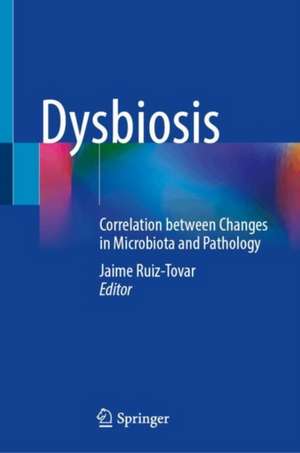Dysbiosis: Correlation between Changes in Microbiota and Pathology
Editat de Jaime Ruiz-Tovaren Limba Engleză Hardback – 29 oct 2024
The volume is divided into 12 chapters: the first two chapters present diagnostic methods and therapeutic options, including prebiotics and probiotics. The remaining ten chapters specifically focus on diseases of different organs. Moreover, the relevance of these findings to precision medicine will be discussed. The book provides biomedical professionals, basic researchers, and clinical practitioners, especially those specialized in Precision Medicine and Integrative Medicine, with information about the effects of dysbiosis on the physiopathology of various diseases. It also includes updated evidence on the impact of dysbiosis on numerous pathologies, such as metabolic diseases, cancer, gynecologic disorders, aging, or pediatric pathologies, going beyond gastrointestinal and central nervous system diseases typically covered in many publications.
Furthermore, the book addresses the translational aspect of dysbiosis. It starts with the basic research knowledge on dysbiosis and disease and aims to provide a translational approach applicable to clinical practice. By combining the fundamental knowledge of biomedical researchers with the clinical applicability of healthcare practitioners, this book bridges the gap between theory and practice.
Preț: 715.71 lei
Preț vechi: 753.39 lei
-5% Nou
Puncte Express: 1074
Preț estimativ în valută:
136.97€ • 148.73$ • 115.05£
136.97€ • 148.73$ • 115.05£
Carte disponibilă
Livrare economică 02-16 aprilie
Preluare comenzi: 021 569.72.76
Specificații
ISBN-13: 9783031656491
ISBN-10: 3031656490
Pagini: 150
Ilustrații: Approx. 150 p. 15 illus., 12 illus. in color. With online files/update.
Dimensiuni: 155 x 235 mm
Greutate: 0.42 kg
Ediția:2024
Editura: Springer Nature Switzerland
Colecția Springer
Locul publicării:Cham, Switzerland
ISBN-10: 3031656490
Pagini: 150
Ilustrații: Approx. 150 p. 15 illus., 12 illus. in color. With online files/update.
Dimensiuni: 155 x 235 mm
Greutate: 0.42 kg
Ediția:2024
Editura: Springer Nature Switzerland
Colecția Springer
Locul publicării:Cham, Switzerland
Cuprins
Microbiota, Microbiome,Applied technologies and omics techniques applied to the microbiota. Metagenomics.- Use of Probiotics, Prebiotics, Symbiotics,Postbiotics,Nutrition and microbiota.-Microbiota and neurodegenerative and brain diseases.-Microbiota and diseases associated with the digestive system.-Microbiota and diseases associated with rheumatic and autoimmune diseases.-Microbiota and diseases associated with metabolic syndrome.-Microbiota and diseases associated with the cardiovascular system.-Microbiota and gynaecological diseases.-Microbiota and cancer.-Microbiota and dermatological diseases.-Microbiota in Neonatology and Paediatrics.-Microbiota and diseases associated with ageing.
Notă biografică
Jaime Ruiz-Tovar, MD, PhD, is a specialist in general and digestive surgery and a Senior Lecturer in Health Sciences at San Juan de Dios School of Nursing and Physical Therapy, Comillas Pontifical University, in Madrid, Spain. He serves as the Head of the Bariatric Surgery section of the ERAS-Spain group (Enhanced Recovery After Surgery). He has been awarded 15 national and international research grants. He received the Prize of the Royal National Academy of Medicine of Spain in 2014 and the Award of the Valencian Society of Surgery for the best scientific article published in 2015. Currently, he is leading several research projects focused on surgical infections, obesity, and translational research on microbiota and probiotics.
Textul de pe ultima copertă
This book discusses in detail the pathological aspects associated with alterations in the gut microbiota and the pathogenesis of different disorders related to dysbiosis. The volume describes the impact of dysbiosis on organs other than the gut and brain, such as metabolic diseases, cancer, gynecologic disorders, aging, or pediatric pathologies. Additionally, it associates the mechanisms and metabolic signaling pathways related to gut microbiota homeostasis and alterations with their clinical impact, highlighting the importance of translational research on dysbiosis.
The volume is divided into 12 chapters: the first two chapters present diagnostic methods and therapeutic options, including prebiotics and probiotics. The remaining ten chapters specifically focus on diseases of different organs. Moreover, the relevance of these findings to precision medicine will be discussed. The book provides biomedical professionals, basic researchers, and clinical practitioners, especially those specialized in Precision Medicine and Integrative Medicine, with information about the effects of dysbiosis on the physiopathology of various diseases. It also includes updated evidence on the impact of dysbiosis on numerous pathologies, such as metabolic diseases, cancer, gynecologic disorders, aging, or pediatric pathologies, going beyond gastrointestinal and central nervous system diseases typically covered in many publications.
Furthermore, the book addresses the translational aspect of dysbiosis. It starts with the basic research knowledge on dysbiosis and disease and aims to provide a translational approach applicable to clinical practice. By combining the fundamental knowledge of biomedical researchers with the clinical applicability of healthcare practitioners, this book bridges the gap between theory and practice.
The volume is divided into 12 chapters: the first two chapters present diagnostic methods and therapeutic options, including prebiotics and probiotics. The remaining ten chapters specifically focus on diseases of different organs. Moreover, the relevance of these findings to precision medicine will be discussed. The book provides biomedical professionals, basic researchers, and clinical practitioners, especially those specialized in Precision Medicine and Integrative Medicine, with information about the effects of dysbiosis on the physiopathology of various diseases. It also includes updated evidence on the impact of dysbiosis on numerous pathologies, such as metabolic diseases, cancer, gynecologic disorders, aging, or pediatric pathologies, going beyond gastrointestinal and central nervous system diseases typically covered in many publications.
Furthermore, the book addresses the translational aspect of dysbiosis. It starts with the basic research knowledge on dysbiosis and disease and aims to provide a translational approach applicable to clinical practice. By combining the fundamental knowledge of biomedical researchers with the clinical applicability of healthcare practitioners, this book bridges the gap between theory and practice.
Caracteristici
Provides updated evidence on translational research on dysbiosis and its relationship with various pathologies Illustrates the impact of dysbiosis on various pathologies affecting the entire organism Details therapeutic approaches that can be applied in clinical settings, derived from basic research
